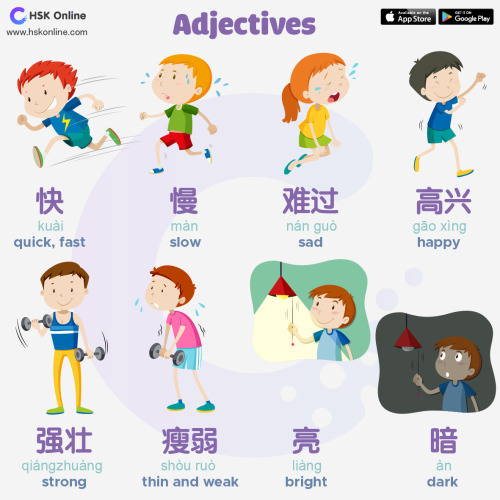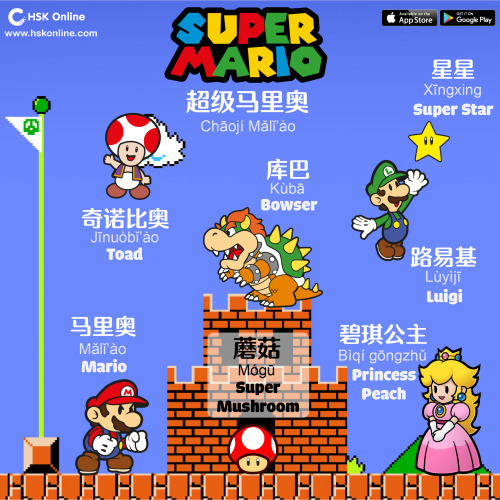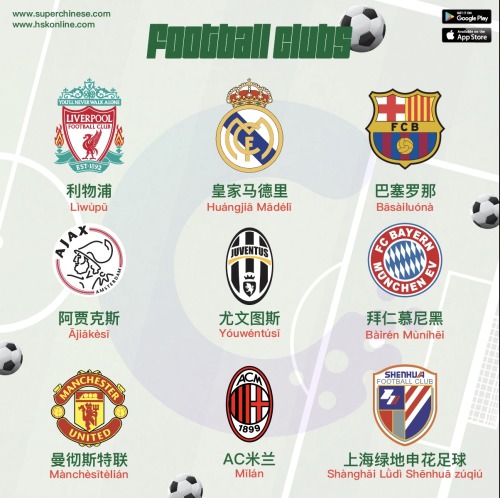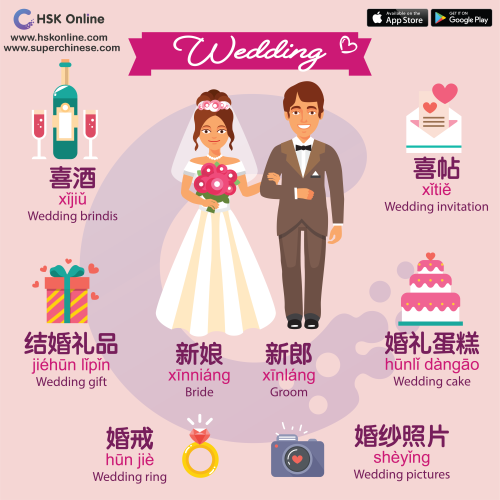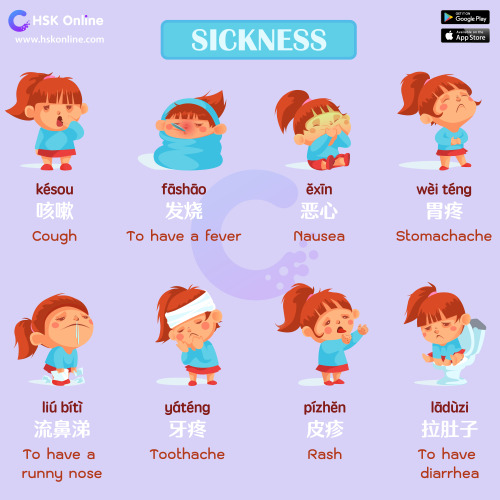#chinese vocab
Some adjectives in Chinese.
I try to write down at least 2-3 Chinese sentences every day, so I won’t lose my progress, especially when it comes to character writing.
Or download the HSK Online or Super Chinese app to put in your daily 10 minutes of study! ^^
Post link
Harry Potter! ❤️❤️
One way I loved practicing my Chinese was by rereading the Harry Potter books! I’d estimate the level to be between HSK 5 and HSK 6, so if you want to work on your reading skills, I can highly recommend this!
Post link

Join our free demo class on these days ⬇️
HSK 4: November 10 8pm (Beijing time)
HSK 5: November 11 6pm (Beijing time)
HSK 6: November 24 8pm (Beijing time)
In our LIVE demo lessons, our teachers will introduce you to the HSK exams, explain what exactly you’ll learn in the 21 live lessons and give you some super useful tips and tricks to make passing your HSK exams easier
We’ll see you there!
Follow the link below to redeem your free demo spot

Wow, brain teaser here! Curious about your answers ^^
Hope no one is feeling like any of these right now! Stay safe and stay healthy everyone! This is your daily reminder to drink enough water~
多喝水!多喝水!
Download our apps here:
Post link

How are you feeling today?
Download our Super Chinese app for Chinese Fluency and HSK Online for all your HSK prep-material in 1 convenient app!

As promised!
Which one has the cutest sound?
alcoholic drink 酒 (jiǔ)
white wine 白葡萄酒 (bái pú táo jiǔ)
red wine 红葡萄酒 (hóng pú táo jiǔ)
cocktail 鸡尾酒 (jī wěi jiǔ)
rice wine 米酒 (mǐ jiǔ)
白酒 ( Baijiu (白酒) is a high-alcohol content spirit made from grain.) (bái jiǔ)
Champagne:香槟酒 xiāng bīn jiǔ
Cider:苹果酒 píng guǒ jiǔ
Brandy:白兰地 bái lán dì
Liquor(Liqueur):烈酒 liè jiǔ
Gin:杜松子酒 dù sōng zǐ jiǔ
Rum:朗姆酒 lǎng mǔ jiǔ
Vodka:伏特加 fú tè jiā
Whisky:威士忌 wēi shì jì
Spirit:酒精 jiǔ jīng
Cider:苹果酒 píng guǒ jiǔ
BDX:波尔多红酒 bō ěr duō hóng jiǔ
Maybe gonna study Mandarin next????
Lately I have been paying more attention to characters that are pronounced differently between the Mainland and Taiwan. This list is definitely not comprehensive, but I wanted to gather the differences I’ve noticed in my own studies. The format below is: Mainland pronunciation | Taiwan pronunciation. I’ve also listed some words containing the characters in question.
究 jiū | jiù - after all / to investigate / to study carefully
研究 yánjiū | yánjiù - research / a study / to research / to look into
讲究 jiǎngjiu | 講究 jiǎngjiù - to pay particular attention to / carefully selected for quality / tastefully chosen
究竟 jiūjìng | jiùjìng - to go to the bottom of a matter / after all / when all is said and done / finally / outcome / result质 zhì | 質 zhí - character / nature / quality / plain / to pawn / pledge / hostage / to question
*In Taiwanese Mandarin, 質 is pronounced zhì when meaning to pawn / hostage, like the word 人質.质量 zhìliàng | 質量 zhíliàng - quality / mass
本质 běnzhì | 本質 běnzhí - essence / nature / innate character / intrinsic quality
质疑 zhìyí | 質疑 zhíyí - to call into question / to question (truth or validity)识 shí | 識 shì - to know / knowledge
知识 zhīshi | 知識 zhīshì - knowledge / intellectual
意识 yìshí | 意識 yìshì - consciousness / awareness / to be aware / to realize
认识 rènshi | 認識 rènshì - to know / to recognize / to be familiar with / to get acquainted with sb / knowledge / understanding / awareness / cognition企 qǐ | qì - to plan a project / to stand on tiptoe
企业 qǐyè | 企業 qìyè - company / firm / enterprise / corporation
企图 qǐtú | 企圖 qìtú - to attempt / to try / attempt
企鹅 qǐ’é | 企鵝 qì’é - penguin息 xī | xí - breath / news / interest (on an investment or loan) / to cease / to stop / to rest
消息 xiāoxi | xiāoxí - news / information
利息 lìxī | lìxí - interest (on a loan)
信息 xìnxī | xìnxí - information / news / message危 wēi | wéi - danger / to endanger
危机 wēijī | 危機 wéijī - crisis
危害 wēihài | wéihài - to jeopardize / to harm / to endanger / harmful effect / damage
危险 wēixiǎn | 危險 wéixiǎn - danger / dangerous突 tū | tú - to dash / to move forward quickly / to bulge / to protrude / to break through / to rush out / sudden
突然 tūrán | túrán - sudden / abrupt / unexpected
突出 tūchū | túchū - prominent / outstanding / to give prominence to / to protrude / to project
突破 tūpò | túpò - to break through / to make a breakthrough / to surmount (an obstacle)
Here’s an update to my original post with 25(!!!) more tone differences. The definitions are from MDBG with a few modifications here and there. I find these soooo interesting, but the one problem is that now I’m sometimes getting confused about which pronunciation to use. So proceed with caution!
差 chà | chā - to differ from / to fall short of / lacking / wrong / inferior
In Mainland China, 差 can be pronounced chā, but the meaning is different:
差 chā - difference / discrepancy / to differ / error / to err / to make a mistake
I guess the two definitions are essentially merged in Taiwanese Mandarin. This honestly sounds great because I often get confused between 差 chà and 差 chā.
相差 xiāngchà | xiāngchā- to differ / discrepancy between
差不多 chàbuduō | chābuduō- almost / nearly / more or less / about the same / good enough / not bad
差点 chàdiǎn | 差點 chādiǎn - almost / nearly
挨 ái | āi - to suffer / to endure / to pull through (hard times) / to delay / to stall / to play for time / to dawdle
This is another example where in the Mainland, the character has multiple pronunciations with different meanings:
挨 āi in order / in sequence / close to / adjacent to
But there is only one pronunciation in Taiwanese Mandarin.
挨打 áidǎ | āidǎ - to take a beating / to get thrashed / to come under attack
挨骂 áimà | 挨罵 āimà - to receive a scolding
综 zōng | 綜 zòng - to sum up / to put together
There is also another (different) pronunciation distinction for this character:
综 zèng | 綜 zòng - heddle (device to form warp in weaving textiles)
错综复杂 cuòzōngfùzá | 錯綜複雜 cuòzòngfùzá - tangled and complicated
综合 zōnghé | 綜合 zònghé - comprehensive / composite / synthesized / mixed / to sum up / to integrate / to synthesize
综艺 zōngyì | 綜藝 zòngyì - variety (entertainment format)
萎 wěi | wēi - to wither / to drop / to decline / spiritless
枯萎 kūwěi | kūwēi - to wilt / to wither / wilted / withered / drained / enervated / exhausted
跌 diē | dié - to fall / to tumble / to trip / (of prices etc) to drop
下跌 xiàdiē | xiàdié - to fall / to tumble
跌倒 diēdǎo | diédǎo - to tumble / to fall / fig. to suffer a reverse (in politics or business)
跌落 diēluò | diéluò - to fall / to drop
档 dàng | 檔 dǎng - official records / grade (of goods) / file / records / shelves / slot / gap / crosspiece / classifier for crosspieces / classifier for events, affairs etc
高档 gāodàng | 高檔 gāodǎng - superior quality / high grade / top grade
文档 wéndàng | 文檔 wéndǎng - (computer) file
搭档 dādàng | 搭檔 dādǎng - to cooperate / partner
帆 fān | fán - sail
According to MDBG, this character is pronounced with the first tone in Taiwan in the word 帆布 (canvas).
Also, there is another fān vs. fán situation where it appears two traditional characters were merged to 帆 in simplified:
帆 fān | 颿 fán - to gallop
帆船 fānchuán | fánchuán - sailboat
一帆风顺 yìfānfēngshùn | 一帆風順 yìfánfēngshùn - propitious wind throughout the journey (idiom) / plain sailing / to go smoothly / have a nice trip!
夹 jiā | 夾 jiá - to press from either side / to place in between / to sandwich / to carry sth under armpit / wedged between / between / to intersperse / to mix / to mingle / clip / folder
Interestingly, there is another definition that is second tone on both sides of the straight:
夹 | 夾 jiá - double-layered / lined (garment)
Also, apparently there are a couple words that are pronounced with the fourth tone in Taiwan:
夹 | 夾 jià - used in 夾生|夹生 and 夾竹桃|夹竹桃
夹克 jiākè | 夾克 jiákè - jacket (loanword)
宁 nìng | 寧 níng - would rather / to prefer / how (emphatic)
In Taiwanese Mandarin, this character is pronounced the same as the pronunciation of 宁 that you are probably more used to seeing:
宁 | 寧 níng - peaceful / to pacify / to visit (one’s parents etc)
宁可 nìngkě | 寧可 níngkě - preferably / one would prefer to…(or not to…) / would rather / (would) be better to / (to pick) the lesser of two evils
宁愿 nìngyuàn | 寧願 níngyuàn - would rather / better
叔 shū | shú - uncle / father’s younger brother / husband’s younger brother
叔叔 shūshu | shúshu - father’s younger brother / uncle
筑 zhù | zhú - to build / to construct / to ram / to hit
In addition, there is a character that is identical in simplified characters with the same pronunciation split:
筑 zhù | 築 zhú - five-string lute
建筑 jiànzhù | 建築 jiànzhú - to construct / building
菌 jūn | jùn - germ / bacteria / fungus / mold
There is also another definition for 菌:
菌 jùn - mushroom
病菌 bìngjūn | bìngjùn - harmful bacteria / pathogenic bacteria / germs
杀菌 shājūn | 殺菌 shājùn - to kill germs / to disinfect / to sterilize
懵 měng | méng - stupid
懵懂 měngdǒng | méngdǒng - confused / ignorant
For 懵懂, because of third tone -> second tone rule, there shouldn’t be a difference. I thought this was amusing.
悄 qiǎo - quiet / sad
In the Mainland, 悄 is third tone in words like 悄然无声, but when duplicated as 悄悄, it is first tone. However, it Taiwan, it remains third tone.
悄悄 qiāoqiāo | qiǎoqiǎo - quietly / secretly / stealthily / quiet / worried
结 jiē | 結 jié - (of a plant) to produce (fruit or seeds)
In the Mainland, there is a distinction between 结 jiē and 结 jié:
结 | 結 jié - knot / sturdy / bond / to tie / to bind / to check out (of a hotel)
结果 jiēguǒ | 結果 jiéguǒ - to bear fruit
So this word sounds just like the 结果 you are probably more familiar with:
结果 | 結果 jiéguǒ - outcome / result / conclusion / in the end / as a result / to kill / to dispatch
载 zǎi | 載 zài - to record in writing / to carry (i.e. publish in a newspaper etc) / year
载 can also be pronounced with the fourth tone in the Mainland, but the meaning is different:
载 | 載 zài - to carry / to convey / to load / to hold / to fill up / and / also / as well as / simultaneously
下载 xiàzǎi | 下載 xiàzài - to download
记载 jìzǎi | 記載 jìzài - to write down / to record / written account
转载 zhuǎnzǎi | 轉載 zhuǎnzài - to forward (a shipment) / to reprint sth published elsewhere
绩 jì | 績 jī - to spin (hemp etc) / merit / accomplishment
成绩 chéngjì | 成績 chéngjī - achievement / performance records / grades
丰功伟绩 fēnggōngwěijì | 豐功偉績 fēnggōngwěijī - glorious achievement
亚 yà | 亞 yǎ - second / next to / inferior / sub- OR Asia / Asian
*The Taiwanese Mandarin dictionaries I looked at actually use yà, not yǎ, but I’ve heard yǎ spoken. I’m guessing it’s a nonstandard pronunciation.
亚洲 yàzhōu | 亞洲 yǎzhōu - Asia
亚军 yàjūn | 亞軍 yǎjūn - second place (in a sports contest) / runner-up
发 fà | 髮 fǎ - hair
发 is a 多音字 in simplified Chinese, but not in traditional:
发 | 發 fā - to send out / to show (one’s feeling) / to issue / to develop / to make a bundle of money / classifier for gunshots (rounds)
头发 tóufa | 頭髮 tóufǎ - hair (on the head)
发型 fàxíng | 髮型 fǎxíng - hairstyle / hairdo
朴 pǔ | 樸 pú - plain and simple
The simplified version of this character has other definitions/pronunciations as well:
朴 piáo | pú - surname Piao (eq. to Korean surname Park)
朴 pò - Celtis sinensis var. japonica
简朴 jiǎnpǔ | 簡樸 jiǎnpú - simple and unadorned / plain
淳朴 chúnpǔ | 淳樸 chúnpú - simple and honest / unsophisticated / guileless
炸 zhá | zhà - to deep fry
炸 zhà - to burst / to explode / to blow up / (fig.) to fly into a rage
Another example of two distinct pronunciations in the Mainland being the same in Taiwan.
炸鸡 zhájī | 炸雞 zhàjī - fried chicken
炸酱面 zhájiàngmiàn | 炸醬麵 zhàjiàngmiàn - pork and fermented soybean paste noodle dish (also known as jjajangmyeon in Korean)
淑 shū | shú - warm and virtuous
This character is not uncommon in names (usually older women).
淑女 shūnǚ | shúnǚ - wise and virtuous woman / lady
褐 hè | hé - brown / gray or dark color / coarse hemp cloth
褐色 hèsè | hésè - brown
驯 xùn | 馴 xún - to attain gradually / to tame
驯服 xùnfú | 馴服 xúnfú - to tame / tame / docile
驯化 xùnhuà | 馴化 xúnhuà - to tame / to domesticate
涛 tāo | 濤 táo - big wave
This character can be found in names, like that of former PRC president Hu Jintao (胡锦涛).
波涛 bōtāo | 波濤 bōtáo - great waves / billows
This is a simple yet lovely song by Super Girl and Sisters Who Make Waves alum Bibi Zhou (who is also one of my favorite singers). This song came out in 2018 and became one of her biggest hits, thus earning its spot in my iconic/popular Mandopop songs series. I’ll admit, I didn’t really notice this song at first just because nothing about it stood out to me. But it grew on me over time. The lyrics are also relatively simple and repetitive, so it’s easy to sing along. Sadly, this song isn’t on US Spotify. The lyric video below has an impressive 19 million views though!
周笔畅 (Bibi Zhou) - 最美的期待
我有一个梦 像雨后彩虹
用所有泪水换来笑容
还有一种爱穿越了人海
拾起那颗迷失的尘埃
你的呼吸 越靠越近 将我抱紧
彩虹 cǎihóng - rainbow
穿越 chuānyuè - to pass through / to traverse / to cross
拾 shí - to pick up / to collate or arrange
我睁开双眼 想你在身边
无所谓永远还是瞬间
静闭上了眼 你却又浮现
带我远离寂寞的边缘
忘了是非没有伤悲无怨无悔
浮现 fúxiàn - to appear before one’s eyes / to come into view / to float into appearance / to come back (of images from the past) / to emerge / it emerges / it occurs (to me that..)
远离 yuǎnlí - to be far from / to keep away from
边缘 biānyuán - edge / fringe / verge / brink / periphery / marginal / borderline
是非 shìfēi - right and wrong / quarrel
无怨无悔 wúyuànwúhuǐ - no complaints / to have no regrets
我拥抱着爱 当从梦中醒来
你执着地等待 却不曾离开
舍不得分开 在每一次醒来
不用再徘徊你就是我最美的期待
执着 zhízhuó - to be strongly attached to / to be dedicated / to cling to
徘徊 páihuái - to dither / to hesitate / to pace back and forth / to hover around / to linger
我睁开双眼 想你在身边
无所谓永远还是瞬间
静闭上了眼 你却又浮现
带我远离寂寞的边缘
忘了是非 没有伤悲 无怨无悔
我拥抱着爱 当从梦中醒来
你执着的等待 却不曾离开
舍不得分开 在每一次醒来
不用再徘徊 你就是我最美的期待
我拥抱着爱 当从梦中醒来
你执着地等待 却不曾离开
舍不得分开 在每一次醒来
不用再徘徊 你就是我最美的期待
There are so many express to say “if” (in the sense of “supposing that”) in Chinese! I’ve gathered all the ways I could think of below. Some are more formal or less formal or might have other uses/meanings. The example sentences are from Pleco.
如果 rúguǒ - if / in case / in the event that
你如果要来,请事先告诉我。
要是 yàoshi - if (colloquial)
要是下雨怎么办?
假如 jiǎrú - if
假如明天开会,准备工作来得及吗?
假使 jiǎshǐ - if / in case / suppose / given
假使他到这儿来,通知我一下。
倘若 tǎngruò - provided that / supposing that / if (literary)
倘若错过这个机会,你会后悔的。
若是 ruòshì - if (literary)
各位若是有不同意见,请即提出。
假若 jiǎruò - if / supposing / in case
假若我来不了,我会通知你的。
的话 dehuà - if (colloquial, coming after a conditional clause)
有事的话,就不要来了。
假设 jiǎshè - to suppose / to presume / to assume / supposing that … / if / hypothesis / conjecture
假设你赢了一百万元,你会买什么?
若 ruò - to seem / like / as / if (literary)
若有问题,请及时与我电话联系。
倘 tǎng - if / supposing / in case (literary)
倘能如此,就最好不过了。
要 yào - important / vital / to want / to ask for / will / going to (as future auxiliary) / may / must / (used in a comparison) must be / probably / if
我要不回来,请替我说一声。
如 rú - as / as if / such as / if (literary)
如妥善处理,问题不难解决。
Here are some others that were listed in the dictionary but that I haven’t actually encountered:
如若、如其、设若、若果、倘或、倘然、倘使、若然、设使、倘使

These are 3 歇后语 we learned in my advanced Chinese class during the spring semester. 歇后语 are an interesting type of saying with two parts. The first part is a bit like a setup, and the second part is kind of an explanation. Sometimes you can just say the first part, and the second is inferred/understood. They are often witty and funny.
水仙不开花——装蒜
Shuǐxiān bù kāihuā——zhuāngsuàn
to act stupid, to play dumb, to pretend to not know
Explanation:
水仙 = daffodil
开花 = bloom
蒜 = garlic
A daffodil that hasn’t bloomed looks kind of like garlic.
铁公鸡——一毛不拔
tiěgōngjī yīmáobùbá
cheapskate, stingy
Explanation:
公鸡 = rooster
拔 = to pull out
If it’s an iron rooster, you can’t even pull off one feather.
哑巴吃黄连——有苦说不出
yǎbachīhuánglián yǒukǔshuōbuchū
to be forced to suffer in silence
Explanation:
哑巴 = a mute person
黄连 = a bitter herb used in Chinese medicine
A mute person who eats this herb cannot say how bitter it is, which is likened to having a pain or hardship you can’t speak of.
As you may or may not know, my new musical obsession is Yoga Lin. This is probably his biggest hit. Oddly, the English title is Fairy Tale, even though 说谎 doesn’t mean fairy tale. I guess I see the connection between lies and a fairy tale though. I personally find this song a bit more difficult to understand than the previous few songs that I’ve shared (I think due to more complex sentence structure). I would describe this song as a pretty typical Mandopop ballad hit, but I found that I really enjoy it even though it doesn’t really stand out in a definitive way. I think it’s because the lyrics hint at a complex and interesting story behind the song.
林宥嘉 (Yoga Lin) - 说谎
是有过几个不错对象 说起来并不寂寞孤单
可能我浪荡 让人家不安 才会结果都阵亡
浪荡 làngdàng - to loiter / to hang around / dissolute / licentious
阵亡 zhènwáng - to die in battle
我没有什么阴影魔障
你千万不要放在心上
我又不脆弱 何况那算什么伤
反正爱情不就都这样
阴影 yīnyǐng - shadow
魔障 mózhàng - Buddhist demon of temptation / obstacle set up by a demon / twists & turns / trials
放在心上 fàngzàixīnshàng - to care about / to take seriously / to take to heart
我没有说谎 我何必说谎
你懂我的 我对你从来就不会假装
我哪有说谎 请别以为你有多难忘
笑是真的不是我逞强
逞强 chěngqiáng - to show off / to try to be brave
我好久没来这间餐厅
没想到已经换了装潢
角落那窗口 闻得到玫瑰花香
被你一说是有些印象
装潢 zhuānghuáng - to mount (a picture) / to dress / to adorn / decoration / packaging
我没有说谎 我何必说谎
你知道的 我缺点之一就是很健忘
我哪有说谎 是很感谢今晚的相伴
但我竟然有些不习惯
健忘 jiànwàng - forgetful
相伴 xiāngbàn - to accompany sbdy / to accompany each other
我没有说谎 我何必说谎
爱一个人 没爱到难道就会怎么样
别说我说谎 人生已经如此的艰难
有些事情就不要拆穿
拆穿 chāichuān - to expose / to unmask / to see through
我没有说谎 是爱情说谎
它带你来 骗我说 渴望的有可能有希望
我没有说谎 祝你做个幸福的新娘
我的心事请你就遗忘
新娘 xīnniáng - bride
Today I’m sharing 13 成语 that each contain all 4 tones (not counting the neutral tone). I just find them really cool for some reason. I either learned these 成语 in class or have encountered them online independently. Example sentences from Pleco.
重男轻女 zhòngnánqīngnǚ - lit. to value males and belittle females (idiom)
中国
我们不应该有重男轻女的观念。异口同声 yìkǒutóngshēng - different mouths, same voice / to speak in unison (idiom)
“没问题。”同学们异口同声地回答。班门弄斧 bānménnòngfǔ - to display one’s slight skill before an expert (idiom)
在你面前班门弄斧,太不好意思了。刻骨铭心 kègǔmíngxīn - lit. carved in bones and engraved in the heart (idiom) / fig. etched in one’s memory / unforgettable
父母对子女的爱,是如此的刻骨铭心。装聋作哑 zhuānglóngzuòyǎ - to play deaf-mute / to feign ignorance
他装聋作哑,说他一点也不知道。南腔北调 nánqiāngběidiào - to speak with a mixed accent
他讲话南腔北调的。胡思乱想 húsīluànxiǎng - to indulge in flights of fancy (idiom); to let one’s imagination run wild
你要是以为自己可以获胜的话,一定是在胡思乱想!海枯石烂 hǎikūshílàn - lit. when the seas run dry and the stones go soft (idiom) / fig. forever / until the end of time
我爱你到海枯石烂。寒风刺骨 hánfēngcìgǔ - bone chilling wind (idiom)
在寒风刺骨的夜里,街上安安静静的。生儿育女 shēng'éryùnǚ - to bear and raise children
他们决定开始生儿育女。言之有物 yánzhīyǒuwù - (of one’s words) to have substance
这篇文章言之有物。举足轻重 jǔzúqīngzhòng - a foot’s move sways the balance (idiom); to hold the balance of power / to play the decisive role
她在政府中的作用举足轻重。以防万一 yǐfángwànyī - to guard against the unexpected (idiom); just in case / prepared for any eventualities
也许不会下雨,不过还是带把伞,以防万一。
I wanted to update this post with some additional 成语. Some of them have been featured on my blog before (mostly from one of my 50 成语 posts hereandhere), but I thought it would be nice to have them collected altogether.
多管闲事 duōguǎnxiánshì - meddling in other people’s business
现在我了解情况了,真希望自己当初没去多管闲事。
步履蹒跚 bùlǚpánshān | bùlǚmánshān - to walk haltingly / to hobble along
那位老太太步履蹒跚地走下楼梯。
My Chinese teacher said this chengyu can also be pronounced bùlǚmánshān.
淡然处之 dànránchǔzhī - to treat indifferently or coolly
面对困难,他淡然处之。
无懈可击 wúxièkějī | wúxièkějí - invulnerable
需要更多证人让案子无懈可击。
In Taiwan, 击 is pronounced jí, so this 成语 wouldn’t fit the all 4 tones requirement.
庸人自扰 yōngrénzìrǎo - to get upset over nothing / to make problems for oneself
事情已经解决,你就别庸人自扰了。
举世无双 jǔshìwúshuāng - unrivaled / world number one / unique / unequaled
他表演的冰上舞蹈真是举世无双。
明目张胆 míngmùzhāngdǎn - openly and without fear / brazenly
小偷明目张胆地开偷来的车。
火上加油 huǒshàngjiāyóu - to add oil to the fire / to aggravate a situation / to enrage people and make matters worse
他心情不好,别火上加油。
提心吊胆 tíxīndiàodǎn - to be very scared and on edge
我对考试结果感到提心吊胆的。
天旋地转 tiānxuándìzhuàn | tiānxuándìzhuǎn - the sky spins and the earth goes round / giddy with one’s head spinning / huge changes in the world
我一站起身就觉得天旋地转。
This 成语 can be pronounced with zhuàn (Mainland) or zhuǎn (Taiwan). Obviously it only contains all 4 tones with zhuǎn.
倾盆大雨 qīngpéndàyǔ - a downpour / rain bucketing down / to be overwhelmed
倾盆大雨让地面湿透了。
天理不容 tiānlǐbùróng - heaven cannot tolerate this / intolerable behavior
对于她来说,这种行为简直天理不容。
奇货可居 qíhuòkějū - rare commodity worth hoarding / object for profiteering
他们把票子当做奇货可居。
There are 15 total tone orders present out of 24 possibilities (4 * 3 * 2 *1). Which orders are included? Let’s look!
6 成语: 1243
3 成语: 2143, 4321
2 成语: 2134, 2431
1 成语: 1324, 1342, 2413, 3124, 3214, 3241, 3412, 3421, 4213, 4231
I thought it was very interesting that 1243 led by quite a bit! I totally did not notice as I was drafting this post. But this is just a small sample, so it isn’t necessarily representative of all 成语.

